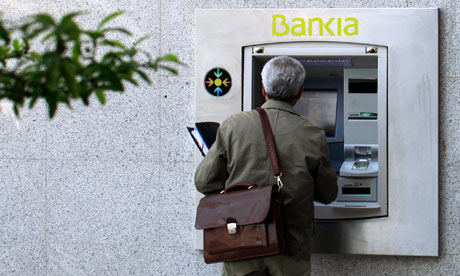http://www.telegraph.co.uk/finance/financialcrisis/9258931/Brussels-to-audit-Spanish-banks.html

Spain’s prime minister, Mariano Rajoy, is on Friday expected to unveil plans to recapitalise the banks by €30bn in a bid to rescue the financial sector alone.
But European officials are thought to be ready to offer Madrid external help, including an audit of the banks and an extension to the deficit reduction targets.
Fears over the crisis on Thursday sent the euro to its lowest level against the pound since August 2008. Analysts said Spanish banks need to raise at least €100bn (£80.2bn) of extra capital, which is “likely” to require international aid.
“Spanish banks face a €68bn capital shortfall over the next three years on increasing bad loan provisions and regulatory capital, in our view,” analysts said. “Capital needs could exceed €98bn in a deeper recession scenario.” They added: “The other Spanish banks will likely need external help to avoid insolvency.”
Spain’s stockmarket fell to a three-year low on Thursday but rebounded to finish up 3.5pc. Traders were boosted by strong corporate results from Repsol. Spanish bank BBVA rose 6.6pc as traders bet the crisis will at last be tackled.
and....
Spain races to shore up troubled banks
• Further measures expected in wake of Bankia bailout
• Analysts warn outflow of investment is 'disruptive'
• Analysts warn outflow of investment is 'disruptive'

Spain is expected to take further steps to reinforce the banking sector following its emergency intervention over Bankia on Wednesday. Photograph: Paul Hanna/Reuters
Measures to overhaul Spain's ailing banking system are expected to be announced on Friday as the government races to shore up confidence in the economy and head off fears that it will need an international bailout to remain in the eurozone.
The emergency measures taken to partly nationalise the country's fourth largest bank, Bankia, on Wednesday are not regarded as enough to encourage investors to start pouring their money back into the country.
Antonio Garcia Pascual, chief economist for southern Europe at Barclays, said that in the past six months there had been large outflows of funds from Spain and that this needed to be tackled. "If foreign investors continue to reduce their exposure to Spain at an economically disruptive rate, the country will require external financial support to manage this adjustment", he said. Some €16bn (£13bn) of public sector funds are already being used to prop up Spain's banks and Pascual believes another €50bn will be needed this year and next as banks recognise losses on a wave of property loans.
The need for intervention comes four years after the UK was bailing out its banks, laden with toxic sub-prime debt. At the time Spaniards were told they had the world's best central bank – one that had banned Spanish banks from buying dubious US mortgage derivatives.
But the scramble to rescue Bankia has shed light on Spain's own version of toxic debt – the vast amount of money loaned to builders, developers and land speculators during a decade-long property boom.
Comparisons are being made with Ireland, where a property boom and bust crippled its three largest banks and led to a bailout of the country, but Pascual believes the comparisons are exaggerated. "None of the large three banks in Spain have needed any public money, unlike in Ireland. In the UK the exposure of the banks to construction and developers, it's about 10% of bank assets. In Spain it's 20% and in Ireland it's over 30%. Ireland had to be bailed out, Spain is under intense market scrutiny, and the UK did not escape unscathed," he said.
It is now clear that Spain's bubble was imploding even as it was being praised for its handling of the 2008 crisis.
The slowdown in construction was already lengthening the dole queues and between 500,000 and 900,000 unsold new homes were on the market. By the end of 2008, it was apparent that Spain's biggest financial risk lay in the close relationship between local savings banks, the politicians who controlled them and the property developers who paid handsome local taxes.
At that stage, with much building land illiquid, there were clear signs of coming disaster. Some 430,000 new homes had been built in the first eight months of 2008 alone – one for every 100 Spaniards.
Rather than own up to losses, Spanish banks chose to roll over loans or allow developers to finish building so that they could take properties instead. Many then left their portfolios of apartment blocks, housing estates and land unsold while giving them unrealistic book values that hid the scale of the problem.
"The bailout should have been done four years ago, as the UK did in 2008," said Eduardo Martínez-Abascal of Spain's IESE business school. "Less money would have been needed and the confidence generated could have boosted growth."
The new government, headed by conservative prime minister Mariano Rajoy, has put pressure on the banks to own up to the scale of their toxic property loans.
Bankia – a 17-month-old conglomeration of seven regional savings banks from areas mostly run by Rajoy's People's party – floated in July and most shares were sold to ordinary Spaniards, who were told this was the "best of the new banks" and who now face large losses.
Rather than gaining strength through size, Bankia became a sick giant with nearly €32bn of problem real-estate assets at the end of 2011. The €4.5bn in government loans given to Bankia over the past two years – which, the government announced on Wednesday, will be turned into shares to give the state 45% of the equity – is expected to be only the tip of the iceberg. The bill for Bankia alone could reach €15bn.
Some great finds there. I usually read the Telegraph, but that article from the Guardian seems to capture it about right. Europe is running out of time to arrange an orderly break-up of the Eurozone; a disorderly collapse will be catastrophic.
ReplyDeleteagriculture investment